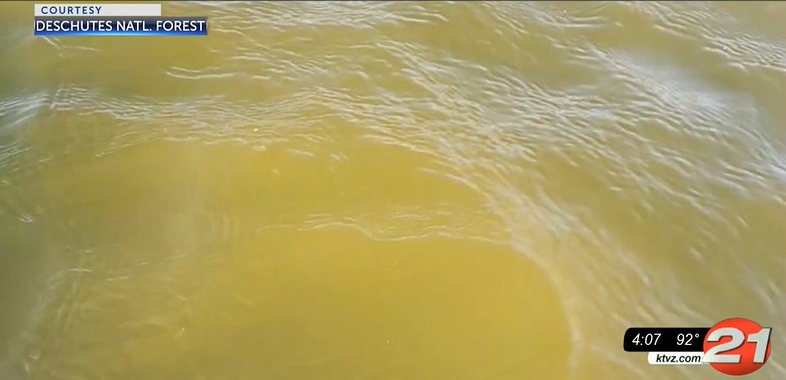OHA advises: Be aware of cyanobacteria blooms as extreme heat continues

PORTLAND, Ore. (KTVZ) — With the extreme heat continuing in the Northwest and more people seeking relief in the many waterbodies around the state, the Oregon Health Authority reminds people heading outdoors to be on the lookout for cyanobacteria (harmful algae) blooms that can produce toxins when recreating in lakes, rivers and reservoirs.
Cyanobacteria are beneficial bacteria found in all freshwater worldwide. Under the right conditions—when sunlight, heat, water temperature, nutrients and water chemistry are ideal—cyanobacteria can multiply into blooms in any water body. Many blooms are harmless, but some can produce cyanotoxins that make people and animals sick.
People should avoid swimming, high-speed water activities, such as water skiing or power boating, and other water activities where incidental ingestion may occur in areas where you believe a cyanobacteria bloom is present. Ingestion is the major route of exposure. Toxins are not absorbed through the skin. However, if you have skin sensitivities you may get a puffy red rash.
Drinking water
Drinking water directly from areas affected by a bloom is especially dangerous. Toxins cannot be removed by boiling, filtering or treating water with camping-style filters. Contact campground management or the local health department with questions about water available at nearby campgrounds or day use areas.
Not all private treatment systems are effective at removing cyanotoxins. If you do not use a well or public water system and draw in-home water directly from an affected area you are advised to use an alternative water source.
Children and pets
Children and pets are at increased risk for exposure because of their size and level of activity. Dogs can get extremely ill and even die within minutes to hours of exposure to cyanotoxins by drinking the water, licking their fur, or eating the toxins from floating mats or dried crust along the shore. This is regardless of a recreational use health advisory in place.
Be aware that dogs can become ill and die from water intoxication after drinking excessive amounts of water while swimming or fetching objects for long periods of time. Intoxication is a potentially fatal disturbance in brain function resulting from an imbalance of electrolytes in the body. Water intoxication and heat stroke can cause similar symptoms as exposure to cyanotoxins.
Symptoms
Exposure to cyanotoxins can be serious and cause a range of symptoms. Symptoms may be similar to food poisoning such as stomach cramping, diarrhea, nausea and vomiting. Symptoms may also be more serious, such as numbness, tingling, dizziness and shortness of breath. These symptoms may require medical attention. Dogs can experience weakness, difficulty walking, seizures, lethargy, loss of appetite and more. If your dog exhibits symptoms veterinary treatment should be sought as quickly as possible.
Fishing
Fish caught from areas where cyanobacteria blooms are present may pose unknown health risks. Fat, skin and organs should be removed before cooking or freezing. Toxins are more likely to collect in these tissues. Fillets should also be rinsed with clean water.
For health information or to report an illness, contact OHA at 971-673-0482.




